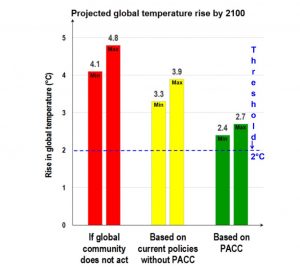President Donald Trump stated, in a letter received by Professor Neil Leary, that “little would change for our climate under the Paris Agreement”. Under the rankings used to gauge the accuracy of statements by Politifact this on can be considered “mostly false”.
Two major “Truth-O-Meter” principals that are used in their rulings are the statements wording and context. When examining the wording of Trumps statement, it becomes hard to qualify his statement as completely false. He states that “little would change” when regarding the climate. In some regards he is right, the changes in global temperatures that the Paris Agreement hopes to achieve occur within the range of a handful of degrees Celsius. However, in the complex system of the climate a small, or little, change can mean a lot. The Paris Agreement may not drastically change the climate but it could reduce the amount that it warms by a few degrees Celsius which is enough to make a difference.
One of the main goals of the Paris Agreement is to keep global warming “no more than 1.5 ℃ above preindustrial levels” by 2021 (Blau p. 23). Studies predict that, under the current climate policies, the “global average temperature could increase by 4.8 ◦C” (Bhore p. 1). For President Trump, the difference of three degrees in may be considered a small change. However, the impact that each could have are very different.

Chart Created by Bhore
When examining the Nationally Determined Contributions (NDC’s) set by each state in the United Natioans, the inaccuracy in President Trump’s statement can be seen. The Paris Agreement lead countries to promise to reduce their harmful ways, “Brunei pledged in 2015 to reduce total energy consumption by 63% by 2035, and to increase the share of power generated by renewables to 10% by 2035; Ecuador committed to an unconditional 20.4% to 25% reduction in energy sector emissions by 2025; Japan to a 26% reduction in emissions on 2013 levels by 2030; and the United States to a 26% to 28% domestic reduction in greenhouse gases by 2025” (Blau p. 25). Although the United States has backed out of its NDC, other states commitments show how the Paris Agreement will positively impact the environment. Reductions in energy consumption, greenhouse gas (GHG) emissions, and investments in solar energy will all effect the global climate by reducing the amount of GHG in the atmosphere. This relationship is explained by Dr. Subhash Janardhan Bhore, “taking everything into account, greenhouse gas emissions and the rise in global temperature does directly affect the atmosphere”, he wrote (Bhore p.1).
The Paris Agreement is strong as it sets up a system that holds all parties accountable for achieving their NDC’s, as every state will benefit from others compliance as well as their own. This international treaty “sets a course for all countries to limit global temperature increase by taking bold steps towards the reduction of greenhouse gas emissions to strengthen resilience with respect to the inevitable impacts of climate change” (Bhore p.4).
The context of Donald Trump’s statement in his letter is also important. Directly after claiming that there will be little impact on the climate he states the Paris Agreement will cause “significant increases” in prices of electricity as it would create a shift away from the harmful fossil fuels industry. This context makes his statements even more inaccurate as he understates the impact that the Paris Agreement will have on the climate while insisting that it will create a large negative impact on the energy prices in the United States. If the demand and technology for renewable clean energies increase then their prices will naturally decrease.
Politifact’s website, http://www.politifact.com/truth-o-meter/, describes a statement as mostly false “if the statement contains an element of truth but ignores critical facts that would give a different impression”. This definition perfectly describes President Trumps statement in this letter. The accuracy of Trump’s statement relies on the definition of the word little. If in this statement, he is regarding the fact that only small amounts of temperature changes will happen due to the Paris Agreement then he is in fact right. However, these “little” changes can have huge consequences, the difference between doing nothing in regards to mitigating climate change and achieving the goals of the largest international environmental treaty can be reflected in a difference of just over three degrees Celsius. Even if President Donald Trump was referring to the magnitude of temperature change as little he would be wrong as small changes, either increasing or decreasing, to temperatures has extreme impacts.
Bibliography
Blau, Judith. The Paris Agreement : Climate Change, Solidarity, and Human Rights, Springer International Publishing, 2017. ProQuest Ebook Central.
Bhore, Subhash Janardhan. “Paris Agreement on Climate Change: A Booster to Enable Sustainable Global Development and Beyond.” International Journal Of Environmental Research And Public Health 13, no. 11 (November 14, 2016): MEDLINE with Full Text, EBSCOhost (accessed September 8, 2017).
Savasan, Zerrin. “A Brief Assessment on the Paris Climate Agreement and Compliance Issue.” International Relations / Uluslararasi Iliskiler 14, no. 54 (April 2017): 107-125. Political Science Complete, EBSCOhost (accessed September 8, 2017).

if the statement contains an element of truth but ignores critical facts that would give a different impression